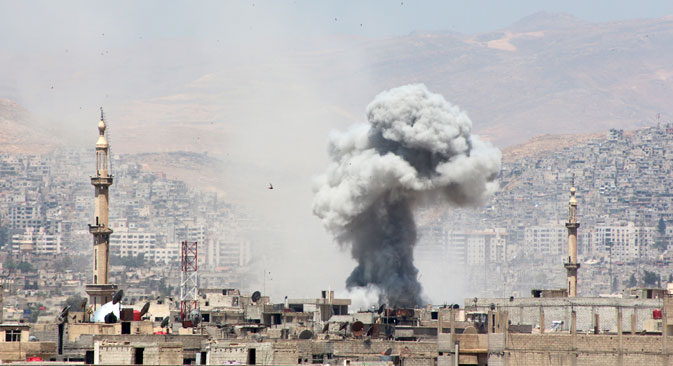
Smoke rises after what activists said was due to airstrikes by forces loyal to Syria's President Bashar al-Assad in Erbeen in the eastern Damascus suburb of Ghouta May 17, 2015. Source: Reuters
U.S. Assistant Secretary of State Victoria Nuland has discussed the Ukrainian crisis with Russian diplomats during her visit to Moscow, reports Gazeta.ru online newspaper. Following the talks, she said that the United States would "encourage all parties" to engage in dialogue on settling the conflict in Ukraine.
Nuland's Russian trip coincided with a visit to Moscow by U.S. Special Envoy for Syria Daniel Rubinstein. Gazeta.ru notes that the two issues are not formally linked, but according to experts, a certain exchange is possible, as both countries are growing closer on the Syrian conflict.
Rubinstein’s arrival in Russia means that "Washington and Moscow understand that they need to find the best solution together," Middle East analyst Theodore Karasik told the website. According to Karasik, the Syrian issue is even more important for Russia today than the Ukrainian one.
In turn, international security expert Igor Zevelev notes that, unlike the Cold War era, a "geopolitical trade" could still happen. "Despite the low level of U.S.-Russian relations, the U.S. wants to enlist the support of Russia on the issues of Syria and Iran. Resolving Ukraine's problems creates a favorable climate for talks on Syria, and vice versa," he said.
The association agreement between Ukraine and the EU, which provoked the Ukrainian Maidan revolution in late 2013, is no longer being obstructed by Russia, reports business daily Kommersant. Russian Minister of Economic Development Alexei Ulyukayev confirmed at the talks in Brussels the participation of the Russian side in the negotiations, which will allow the economic part of the EU-Ukraine agreement to come into force on January 1, 2016, the report says. Contrary to expectations, Russia does not propose a further delay in the date, Kommersant notes.
Russia, the EU and Ukraine agreed at the talks in Brussels on the establishment of an expert group to prepare materials by July 2015 on problematic issues related to customs and technical regulation, as well as pest control, in connection with the forthcoming entry into force of the Ukraine-EU association agreement.
However, according to experts, the free trade area agreement between the EU and Ukraine does not pose significant risks for Russian manufacturers – there is no question of the vulnerability of the Russian market in the conditions of a sharp drop in mutual turnover and a recession in the Ukrainian economy, according to Alexander Knobel, the director of the Center for Research on International Trade at the Russian Presidential Academy of National Economy and Public Administration.
The business magazine Expert analyzes the possible consequences of the Iranian nuclear deal for Russia. According to the magazine, many analysts believe that the deal in itself is not beneficial to Russia, while Moscow wants to keep Iran under sanctions. Currently, Iran is subject to a number of restrictions, which have made Russia its sole partner, Expert notes.
In addition, analysts say, Russia fears that the lifting of sanctions against Iran will lead to the entry of Iranian hydrocarbons into foreign markets and, consequently, a reduction in global prices. Expert adds that the Iranians have promised to dramatically increase their oil exports as soon as the sanctions are lifted. As for the export of Iranian gas to the EU through the proposed Nabucco pipeline, with which Gazprom is being intimidated, it may be possible only in the medium term, according to the experts quoted in the magazine; Iran needs to build a pipeline network from its southern oil fields to the Turkish border and normalize relations with Turkey.
The analysts believe that Moscow may lose a significant share of its influence in the Middle East in case of the lifting of sanctions against Iran, Expert writes. This did look like it was true until recently; Iran was Russia's main partner in the region. However, over the past few years, the Russian authorities have managed to find alternative support and attract countries that needed to diversify their special relationship with the United States, primarily Egypt. Moscow has also managed to establish working relations with Saudi Arabia and the Gulf countries, writes the magazine.
All rights reserved by Rossiyskaya Gazeta.
Subscribe
to our newsletter!
Get the week's best stories straight to your inbox